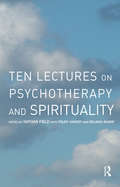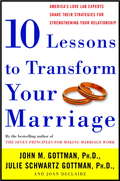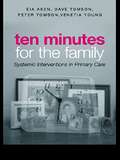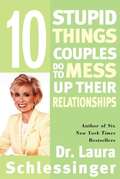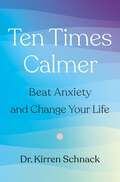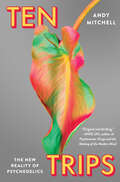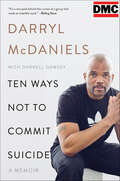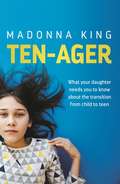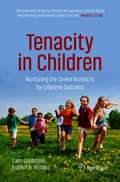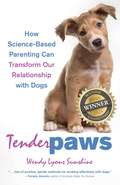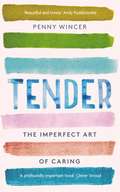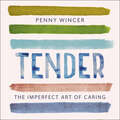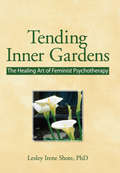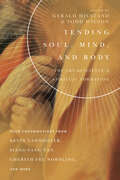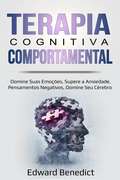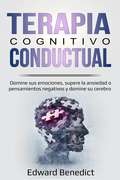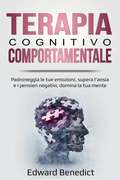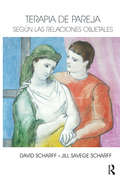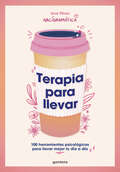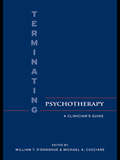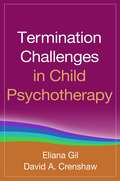- Table View
- List View
Ten Lectures on Psychotherapy and Spirituality
by Belinda Sharp Nathan Field Trudy HarveyThis volume is a much-needed exploration of contemporary theories on psychotherapy and spirituality, moving away from the more traditional, non-spiritual aspects of psychoanalysis and psychotherapy. The book consists of a dialogue between the opposing sides; most of the papers have responses from the "other" side. This dialogue mirrors the early communication between Freud and Jung regarding spirituality, and opens up doors for continuing collaboration between psychoanalysis as a pure science and the spiritual and religious dimensions within. This inspiring collection of papers grew from the lectures held in 2002 at the London Centre for Psychotherapy. In the time of increased interest in more scientific schools of psychoanalysis such as neuropsycho-analysis, there is also a surge of interest in spirituality within psychoanalysis, as demonstrated by the great interest in these lectures.
Ten Lessons to Transform Your Marriage
by John Gottman Julie Schwartz Gottman Joan DeclaireIn 1994, Dr. John Gottman and his colleagues at the University of Washingto— made a startling announcement: Through scientific observation and mathematical analysis, they could predict—with more than 90 percent accuracy—whether a marriage would succeed or fail. The only thing they did not yet know was how to turn a failing marriage into a successful one, so Gottman teamed up with his clinical psychologist wife, Dr. Julie Schwartz Gottman, to develop intervention methods. Now the Gottmans, together with the Love Lab research facility, have put these ideas into practice. In Ten Lessons to Transform Your Marriage, the Gottmans share this vital information so that couples can develop the skills to turn their relationship problems around and create strong, lasting unions.<P><P> What emerged from the Gottmans’ collaboration and decades of research is a body of advice that’s based on two surprisingly simple truths: Happily married couples behave like good friends, and they handle their conflicts in gentle, positive ways. The authors offer an intimate look at ten couples who have learned to work through potentially destructive problems—extramarital affairs, workaholism, parenthood adjustments, serious illnesses, lack of intimacy—and examine what they’ve done to improve communication and get their marriages back on track. <P> Giving an insider’s view of the Love Lab, the Gottmans take the reader step-by-step through the couples’ conversations, before and after they are counseled. The authors also provide an analysis of the couples’ interactions, identifying their core problems and offering suggestions for resolving them. By “listening” to the discussions in this way, you will learn to detect the most common stumbling blocks of a relationship and—most important—how to avoid them. <P> Hundreds of thousands have seen their relationships improve thanks to the Gottmans’ work. Whether you want to make a strong relationship more fulfilling or rescue one that’s headed for disaster, Ten Lessons to Transform Your Marriage is essential reading.<P> From inside the famed Gottman Institute, aka the “Love Lab”: ten scientifically proven, practical ways to strengthen your marriage<P> “We don’t feel close anymore.”<P> “You never talk to me.”<P> “We only have time for the kids.” <P> “All you do is work.”<P> “You don’t care about my dreams.”<P> Do you recognize yourself, or your spouse, in any of these statements? If so, Dr. John Gottman and his wife, Dr. Julie Schwartz Gottman, say you shouldn’t be surprised. In fact, their decades of scientific research have shown that most couples face these and other serious problems—but what the Gottmans have proven is that such difficulties don’t have to lead to a broken relationship, or even divorce.<P> In Ten Lessons to Transform Your Marriage, the Gottmans provide vital tools—scientifically based and empirically verified—that you can use to regain affection and romance lost through years of ineffective communication. You’ll strengthen your relationship and make it the most fulfilling it can be.
Ten Lessons to Transform Your Marriage: America's Love Lab Experts Share Their Strategies for Strengthening Your Relationship
by John Gottman Julie Schwartz Gottman Joan DeclaireIn Ten Lessons to Transform Your Marriage, marital psychologists John and Julie Gottman provide vital tools--scientifically based and empirically verified--that you can use to regain affection and romance lost through years of ineffective communication.In 1994, Dr. John Gottman and his colleagues at the University of Washington made a startling announcement: Through scientific observation and mathematical analysis, they could predict--with more than 90 percent accuracy--whether a marriage would succeed or fail. The only thing they did not yet know was how to turn a failing marriage into a successful one, so Gottman teamed up with his clinical psychologist wife, Dr. Julie Schwartz Gottman, to develop intervention methods. Now the Gottmans, together with the Love Lab research facility, have put these ideas into practice. What emerged from the Gottmans' collaboration and decades of research is a body of advice that's based on two surprisingly simple truths: Happily married couples behave like good friends, and they handle their conflicts in gentle, positive ways. The authors offer an intimate look at ten couples who have learned to work through potentially destructive problems--extramarital affairs, workaholism, parenthood adjustments, serious illnesses, lack of intimacy--and examine what they've done to improve communication and get their marriages back on track. Hundreds of thousands have seen their relationships improve thanks to the Gottmans' work. Whether you want to make a strong relationship more fulfilling or rescue one that's headed for disaster, Ten Lessons to Transform Your Marriage is essential reading.From the Hardcover edition.
Ten Minutes for the Family: Systemic Interventions in Primary Care
by Eia Asen Dave Tomson Venetia Young Peter TomsonThe provision of suitable mental health care is one of the major tasks facing general practitioners and their teams. Family-oriented primary care has moved from doctor-controlled to patient-centred consultations, with a greater emphasis on collaboration. The systemic framework uniquely lends itself to this shift in emphasis, as it views the delivery of care in social rather than merely medical terms. There is now a strong evidence base for the efficacy of systemic approaches in managing many different types of mental health and relationship issues.This text is a practical guide for health professionals working in primary care who wish to improve their management of problem patients, problem families and problem situations. Step-by-step, it introduces both the theory and the practice of the family approach - from interviewing individual patients in routine consultations to conducting specific family crisis meetings. It includes many concrete suggestions for using simple family therapy techniques and encourages the clinician to think about cases constructively. Case histories and patient stories are used extensively to illustrate the techniques as well as boxed information to highlight key points.
Ten Stupid Things Couples Do to Mess Up Their Relationships
by Laura Schlessinger1. Stupid Secrets Withholding important information for fear of rejection 2. Stupid Egotism Asking not what you can do for the relationship but only what the relationship can do for you 3. Stupid Pettiness Making a big deal out of the small stuff 4. Stupid Power Always trying to be in control 5. Stupid Priorities Consuming all your time and energies with work, hobbies, errands, and chores instead of focusing on your relationship 6. Stupid Happiness Seeking stimulation and assurance from all the wrong places to satisfy the immature need to feel good 7. Stupid Excuses Not being accountable for bad behavior 8. Stupid Liaisons Not letting go of negative attachments to friends and relatives who are damaging to your relationship 9. Stupid Mismatch Not knowing when to leave and cut your losses 10. Stupid Breakups Disconnection for all the wrong reasons
Ten Thousand Dreams Interpreted or What's in a Dream
by Gustavus Hindman Millerinterpretation of 10,000 dreams
Ten Times Calmer: Beat Anxiety and Change Your Life
by Dr. Kirren SchnackFeeling better starts now.Dr. Kirren Schnack is here to tell you that your anxiety isn’t here to stay. Whether you’re going through something and need support to feel like yourself again, or if you have been dealing with anxious thoughts for a long time, Ten Times Calmer has the help you’ve been looking for.Dr. Kirren is an Oxford trained clinical psychologist with twenty years’ experience. In Ten Times Calmer she offers a first aid kit of tools to help you understand what you’re going through and change how you’re feeling – and it might just be easier than you think.Not everyone has access to therapy and not everyone needs it, but we could all do with a little more calm in our lives. The ten chapters cover everything from dealing with anxious thoughts and stress to managing uncertainty and safely tackling trauma, and each takes you a step closer to an anxiety-free life. Inside you’ll find short anxiety busting exercises with a big impact and a toolkit of well-researched and clinically proven tips that will help you find calm each and every day.
Ten Trips: The New Reality of Psychedelics
by Andy MitchellThe more we learn about psychedelics, the less we seem to understand them. . . . In this engrossing, sometimes hilarious, always dramatic chronicle, a neuropsychologist deflates the hype, explores the limitless possibilities, and reveals a much-needed perspective about psychedelics, giving us a scientist’s first-person experiment with ten different compounds in ten different settings. Once demonized and still largely illegal, psychedelic drugs are now officially a “breakthrough therapy” in treating mental illness, used to heal trauma, conquer addiction, and enhance well-being. But as Andy Mitchell reveals, this approach to psychedelics is overhyped, and most importantly, neglects what is so unusual and valuable about them: the psychedelic experience itself.In Ten Trips, Mitchell takes ten different drugs in ten diverse locations—including a neuroimaging lab in London, the Columbian Andes, Silicon Valley and his friend’s basement kitchen—to document their remarkable effects. Along the way he encounters a cast of distinctive characters: scientists and gangsters, venture capitalists and philosophers, psychonauts and shamans, musicians, monks, therapists, poets, and conmen. His experience opens a doorway to psychedelics’ full potential: for healing and trauma, for ecstatic one-ness and utter terror, for transcendence and corruption, for profundity and laughter.Mitchell argues that by removing psychedelics from their cultures and rituals, both indigenous and underground, we risk rejecting the expertise and the contexts which hold the key to understanding them—and from which their real benefits may derive. In the drive to standardize, control, and monetize the psychedelic experience, we may ultimately destroy what makes them potent: their ability to transform our whole perspective on mental health and reenchant us with the world.A hallucinogenic experience nearly as mind-blowing as actually taking psychedelics themselves, Ten Trips is Michael Pollan’s How to Change Your Mind written by Hunter S. Thompson with a PhD in neuroscience—a perception-altering odyssey that will change the way we see these substances and the world.
Ten Ways Not to Commit Suicide: A Memoir
by Darrell Dawsey Darryl McDanielsIn this surprising and moving memoir, the legendary rap star and cofounder of Run D.M.C. keeps it a hundred percent, speaking out about his battle with depression and overcoming suicidal thoughts—one of the most devastating yet little known health issues plaguing the black community today.As one third of the legendary rap group Run D.M.C., Darryl “DMC” McDaniels—aka Legendary MC, The Devastating Mic Controller, and the King of Rock—had it all: talent, money, fame, prestige. While hitting #1 on the Billboard charts was exhilarating, the group’s success soon became overwhelming. A creative guy who enjoyed being at home alone or with his family, DMC turned to alcohol to numb himself, a retreat that became an addiction. For years, he went through the motions. But in 1997, when intoxication could no longer keep the pain at bay, he plunged into severe depression and became suicidal. He wasn’t alone. During the same period, suicide became the number three leading cause of death among black people—a health crisis that continues to this day.In this riveting memoir, DMC speaks openly about his emotional and psychological struggles and the impact on his life, and addresses the many reasons that led him—and thousands of others—to consider suicide. Some of the factors include not being true to who you are, feelings of loneliness, isolation, and alienation, and a lack of understanding and support from friends and family when it’s needed most. He also provides essential information on resources for getting help. Revealing how even the most successful people can suffer from depression, DMC offers inspiration for everyone in pain—information and insight that he hopes can help save other lives.
Ten-Ager: What your daughter needs you to know about the transition from child to teen
by Madonna KingFrom the author of BEING 14 and FATHERS AND DAUGHTERS comes a book that shares what your daughter needs you to know about her shift from child to teenager - how she feels, what she thinks, what worries her and what you can do to help.Science tells us that the shift from childhood to teenager is happening earlier than ever before. Girls are starting puberty well before the age of thirteen. With heightened pressure from what they see in the media, in movies and on TV, girls are leaving childhood behind well before they hit their teens. This shift is an abrupt one and can come as a shock to parents. Not surprisingly, emotions can be heightened and relationships can be fraught. So many parents struggle to understand the pressures their daughters are under and how to deal with their emotional volatility. Journalist and social commentator Madonna King has an extraordinary ability to connect with experts, schools and the girls themselves to deliver the answers parents need and the communication their children want. This is an important book that shows that 10 is the new start of a girl's teenage years. It raises the issues our girls might not be talking about publicly, and guides their parents on how experts believe we should deal with it.
Tenacity in Children: Nurturing the Seven Instincts for Lifetime Success
by Sam Goldstein Robert B. BrooksTenacity in Children examines how multiple generations of parents and caregivers raised children to become successful adults. Until relatively recent times in human history, there were no schools or organized institutions, nor were there parenting books. Rather, caregivers depended on the seven important instincts that evolved across tens of thousands of years in the human species. This volume highlights the ways in which these instincts are more important than ever in preparing children for tomorrow’s successes. Key areas of coverage include individual chapters devoted to examining each of the seven instincts – intuitive optimism, intrinsic motivation, compassionate empathy, simultaneous intelligence, genuine altruism, virtuous responsibility, and measured fairness – as well as practical strategies to guide children in acquiring and fine-tuning these essential human instincts.Tenacity in Children provides a solid foundation to prepare children for a resilient and happy future. It offers well-defined guideposts for adults committed to providing every child with the opportunity to access, strengthen, and employ these instincts as they negotiate childhood and passage into adult life. This book also serves as a rich resource for researchers, practitioners, and graduate students in mental health and public health disciplines as well as many interrelated fields as we all strive to promote the well-being of children. The collaboration of these two esteemed psychologists has been impacting on our field for decades. This new book continues that tradition.– Richard D. Lavoie, M.A., M.Ed.Author of It's So Much Work to Be Your Friend:Helping Children with Learning Disabilities Find Social Success Tenacity in Children is the perfect balance between concepts, knowledge, scientific discourse, practical ideas and touching stories that truly illustrate the principles shared in the book. This book should reach the hands of every person dedicated to working with children.– Encarni Gallardo, MBA, CBMExecutive Director, Children’s Service Society of Utah Written in an easy-to-read, narrative style, Drs. Goldstein and Brooks impart their innovative concept of Tenacity in Children along with its seven essential instincts by using heartwarming stories, personal and professional insights, research, and wisdom.– Joyce C. Mills, Ph.D.Co-author of Therapeutic Metaphors for Children and the Child Within Visit our website at www.tenacityinchildren.com
Tender Paws: How Science-Based Parenting Can Transform Our Relationship with Dogs
by Wendy Lyons SunshineTender Paws takes a deep dive into the practical benefits of applying therapeutic parenting best practices to dogs in our care.When Wendy Lyons Sunshine got her first puppy—abandoned behind a gas station, struggling with worms and anemia—she was in over her head. As puppy training guides failed to help her with the out-of-control, traumatized bundle of teeth and claws rescue pup, she turned to her work helping world-class child development experts. Could strategies for raising happy, well-adjusted kids transfer to a puppy? As it turns out, yes, they can! From the first try, parenting wisdom transformed Sunshine&’s relationship with her challenging little one. Soon enough, Sunshine&’s view of her puppy shifted from one of adversity to one of compassion and understanding, and she was able to bring patience and therapeutic concepts to meet her dog&’s needs. When Sunshine reached out to experts, they affirmed that science-based principles used with at-risk children align well with best practices of holistic, positive, and progressive dog handling. Exploring parallels between human and canine research, attachment styles, history of trauma, parenting styles, and her own &“inner child&” proved a mindful path for pet parenting. Far from a standard dog training manual, Tender Paws explicitly applies parenting wisdom and best practices used with special needs kids to a cross-section of scenarios, from recognizing developmental trauma and unmet core needs, to making decisions about appropriate equipment, to responding to difficult behavior, to understanding the parenting style from which we approach our dogs. Sunshine empowers you and your dog by offering: A synthesis of the fields of child development, attachment, trauma, sensory integration, neurobiology, learning, animal behavior, and ethology. A problem-solving framework that makes dog training decisions clearer and behavior frustrations easier to resolve. Parenting wisdom to help your dog move beyond trauma and into wellness. Borrowing the principles of parenting for dogs feels obvious to some people: instinctive and ordinary and inevitable. But that&’s not true for everyone, especially those of us who had a less than ideal childhood and bear the scars of early harm, loss, trauma, or deprivation. Tender Paws provides an interdisciplinary, comprehensive, evidence-based guide for readers who want to honor the needs of—and improve outcomes for—puppies and dogs they care about.
Tender: The Imperfect Art of Caring - 'profoundly important' Clover Stroud
by Penny Wincer'A beautiful and important book that is both deeply engaging and usefully practical. I loved it.' CATHY RENTZENBRINK'An insightful and well-timed book ... forces us to confront the stereotypes - and prejudices - we hold.' SUNDAY TIMES'profoundly important...full of wisdom and bright insights on what it really means to love someone, by a fearless and generous writer. ' CLOVER STROUD'A beautiful and timely reminder that each and every one of us has the ability to care, the capacity for empathy, and the potential to grow.' ANDY PUDDICOMBE, FOUNDER OF HEADSPACE'A wonderful book: compassionate, honest, carefully-reasoned and genuinely helpful... This will benefit many people.' KATHERINE MAY, author of WINTERING 'An invaluable tool for any invisible carers or anyone who wants to learn how to better support their loved ones... we ALL have many, many things to learn from Penny's beautiful, wise, charming, thoughtful words' SCARLETT CURTIS, Sunday Times bestselling author'Moving and beautifully written, nuanced and wise, alert to every paradox at the heart of love. A hugely important book not only for current or future carers, but anyone learning to accept that life tends to resist our control.' OLIVIA SUDJIC, author of EXPOSURE'Tender captures the powerful capacity of people to care for others, and all the heartbreaking and heartwarming complexity that this involves. Penny brings the crucial, yet often overlooked, role of caring into our collective consciousness and, in doing so, demonstrates what it means to be human.' -DR EMMA HEPBURN, author of A TOOLKIT FOR MODERN LIFE'Penny Wincer's TENDER manages to combine both unromanticised honesty about the realities of care with a genuine uplifting hopefulness... is a must-read.' RUTH WHIPPMAN, author of THE PURSUIT OF HAPPINESSWe are all likely - at some point in our lives - to face the prospect of caring for another, whether it's a parent, child or partner. It is estimated that there are 7 million people in the UK caring for loved ones. And yet these are the unpaid, unsung people whose number is rising all the time. In Tender: the imperfect art of caring, Penny Wincer combines her own experiences as a carer with the experiences of others to offer real and transformative tools and insights for navigating a situation that many of us are either facing or will face at some time. Penny Wincer has twice been a carer: first to her mother, and now as a single parent to her autistic son. Tender shows how looking after oneself is a fundamental part of caring for another, and describes the qualities that we can look to cultivate in ourselves through what may otherwise feel to be an exhausting task. Weaving her lived experience with research into resilience, perfectionism and self-compassion, Penny combines the stories of other carers alongside those who receive support - offering an often surprising and hopeful perspective.Penny hosts a podcast Not Too Busy To Write.
Tender: The Imperfect Art of Caring - 'profoundly important' Clover Stroud
by Penny WincerA personal, positive and essential book for the many carers among us. 'A wonderful book: compassionate, honest, carefully-reasoned and genuinely helpful... This will benefit many people.' KATHERINE MAY, author of WINTERING 'An invaluable tool for any invisible carers or anyone who wants to learn how to better support their loved ones... we ALL have many, many things to learn from Penny's beautiful, wise, charming, thoughtful words' - SCARLETT CURTIS, Sunday Times bestselling author'An astonishing book about everyday experience. Moving and beautifully written, nuanced and wise, alert to every paradox at the heart of love. A hugely important book not only for current or future carers, but anyone learning to accept that life tends to resist our control.' - OLIVIA SUDJIC, author of EXPOSURE'Penny Wincer's TENDER manages to combine both unromanticised honesty about the realities of care with a genuine uplifting hopefulness... is a must-read.'- Ruth Whippman, author of THE PURSUIT OF HAPPINESS: WHY ARE WE DRIVING OURSELVES CRAZY AND HOW CAN WE STOP?We are all likely - at some point in our lives - to face the prospect of caring for another, whether it's a parent, child or partner. It is estimated that there are 7 million people in the UK caring for loved ones. And yet these are the unpaid, unsung people whose number is rising all the time. In Tender: the imperfect art of caring, Penny Wincer combines her own experiences as a carer with the experiences of others to offer real and transformative tools and insights for navigating a situation that many of us are either facing or will face at some time. Penny Wincer has twice been a carer: first to her mother, and now as a single parent to her autistic son. Tender shows how looking after oneself is a fundamental part of caring for another, and describes the qualities that we can look to cultivate in ourselves through what may otherwise feel to be an exhausting task. Weaving her lived experience with research into resilience, perfectionism and self-compassion, Penny combines the stories of other carers alongside those who receive support - offering an often surprising and hopeful perspective.
Tending Inner Gardens: The Healing Art of Feminist Psychotherapy
by Lesley I ShoreTending Inner Gardens: The Healing Art of Feminist Psychotherapy transforms the theory and practice of psychotherapy, one that values both the feminine and masculine perspectives. Set within a naturalistic framework, this model utilizes nature’s growing and healing processes. It proposes nature’s seasonal cycles as a model for the psychotherapy process, and author Lesley Irene Shore introduces nature’s seasonal cycle as a model for successful psychotherapy and demonstrates how to tune techniques to the rhythms of each season.Dr. Shore speaks with the voice of an experienced psychotherapist, sharing her struggles with therapeutic dilemmas and addressing issues common to every practitioner. She refuses to present simple solutions to the difficult process of helping people grow, yet offers new ways of thinking about this work. Readers will find this a healing book--for themselves as well as for their clients.The book covers relationship issues as well as the use of language, hypnosis, dreams, and creativity. Specific areas readers learn about include: language--teaches therapists to differentiate between questions that address conscious regions of the mind and ones which communicate with less conscious processes. metaphor--describes ways of working with metaphors to access less conscious processes trauma--explores the effects of psychological trauma and offers tools for healing its wounds psychotherapy process--uses nature’s seasonal cycle to chart the process of psychotherapyTending Inner Gardens transcends the artificial dichotomies currently characterizing much psychological thought. Psychotherapists will be interested in the natural model of psychotherapy which integrates a wide range of ideas and theories, especially the sections on the psychotherapy relationship, dreams, creativity, working with metaphors, language, and the process of psychotherapy. Interesting case studies illuminate this material. Students can benefit from seeing how the tools of psychotherapy are integrated with the art. Laypeople will enjoy reading about Dr. Shore’s personal evolution as a therapist, her life on Harmony Farm, and her cases, which are discussed in detail.While this book is primarily geared toward a professional audience, it attracts a wide range of readers. It should be read by experienced psychotherapists, faculty members, and practitioners, as well as those in training. This would generally include psychiatrists, psychologists, social workers, counselors, psychiatric nurses, and related professions. And while the book presents a primarily verbal, psychodynamic approach toward healing, its theoretical conceptualization will appeal to professionals in healing traditions such as art therapy, massage therapy, and expressive therapy.
Tending Soul, Mind, and Body: The Art and Science of Spiritual Formation (Center for Pastor Theologians Series)
by Todd Wilson Gerald Hiestand Gerald Hiestand, Todd WilsonThroughout his ministry, Jesus consistently demonstrated his concern and love for the whole person: soul, mind, and body.That task is carried forward today by pastors and church leaders, who are called to care for people in the midst of individual circumstances as well as seismic cultural shifts. How might that calling be informed by recent developments in psychology? How should the church attend to matters of mental health? How might psychology and counseling aid us in our spiritual formation?Based on the 2018 Center for Pastor Theologians conference, this volume brings together reflections by pastors, theologians, and psychologists who explore the relationships among three fields of study—theological anthropology, spiritual formation, and modern psychology. The result is a vibrant whole-person theology that can aid the church today in its centuries-old call to care for the soul, mind, and body.Based on annual CPT conferences, the volumes in the Center for Pastor Theologians series bring together the reflections of pastors and theologians who desire to make ongoing contributions to the wider scholarly community for the renewal of both theology and the church.
Terapia Cognitiva Comportamental: Domine Suas Emoções, Supere a Ansiedade, Pensamentos Negativos, Domine Seu Cérebro.
by Edward BenedictSe você sofre de qualquer tipo de doença mental, ansiedade, estresse, depressão, etc. Este é o livro que você deve receber. Ao contrário de outros livros, este livro tem analisado os diferentes comportamentos que as pessoas têm e como eles os afetam a ponto de lutar contra as doenças mentais. O livro foi adiante para dar conselhos e soluções ao leitor. Este é um livro que você poderá consultar de tempos em tempos. Ele lhe dá uma visão do que você deve fazer para que você possa viver uma vida livre da dor e da dor que você sente. Depressão e ansiedade são reais e estão em ascensão. Isto é porque muitas pessoas não foram equipadas com as habilidades certas para serem capazes de lidar com isso. Este é o objetivo deste ebook, fornecer ao leitor as habilidades relevantes que podem ajudá-los a conter o estresse e a depressão. Como? Fazendo uma extensa pesquisa e olhando as coisas de uma perspectiva diferente daquela a que você está acostumado. Este livro dará ao leitor uma visão de como fortalecer sua mente e como você pode mudar as histórias que você mesmo tem alimentado. Como um leitor pronto para aprender e saber mais sobre como a terapia cognitiva comportamental pode mudar sua vida, aqui estão alguns dos capítulos que você encontrará dentro de você. Dentro você vai encontrar Saia de si mesmo Quebra de conexões tóxicas Domine suas expectativas Largue as narrativas egocêntricas Mude a forma como você processa suas informações e muda sua vida Você pode se tornar um melhor juiz da realidade E muito mais....
Terapia Cognitiva para Trastornos de Ansiedad
by David A. Clark y Aaron T. BeckDurante las dos últimas décadas hemos presenciado un tremendo progreso en el conocimiento y tratamiento de los trastornos de ansiedad. Los enfoques derivados de la terapia cognitiva, particularmente, han logrado una base sustancial de apoyo empírico. En el presente libro, escrito por una autoridad contemporánea David A. Clark y por el pionero de la terapia cognitiva Aaron T. Beck, se sintetizan los últimos avances logrados en el campo y se presentan pautas actuales de práctica terapéutica basadas en los hallazgos más recientes. Otras características que hacen recomendable y manejable el libro son las síntesis, a modo de pequeños manuales, de los cinco principales trastornos de ansiedad, los aspectos clínicos concisos, los casos presentados con todo detalle y más de treinta cuestionarios y formularios que pueden emplearse en la práctica.En la Primera parte se actualiza y reformula el influyente modelo de los trastornos de ansiedad que Beck y sus colaboradores propusieron en 1985. Los autores aclaran las múltiples facetas de la ansiedad maladaptativa y del papel que desempeña la cognición en su desarrollo y mantenimiento. Sucintamente se revisan cientos de estudios empíricos que examinan las hipótesis del modelo. Sobre esta base se asienta la Segunda parte, la cual detalla las principales estrategias clínicas cuyo alcance es transdiagnóstico -efectivo y relevante para cualquier tipo de presentación de los síntomas de ansiedad. En esta parte se describen, paso a paso, el modo de dirigir la valoración, de formular los casos individuales y de implementar la reestructuración cognitiva y las intervenciones conductuales. La Tercera parte se destina más específicamente a los trastornos más prevalentes: el trastorno de angustia, el trastorno obsesivo-compulsivo y el trastorno por estrés postraumático. Los datos específicos de cada trastorno, las conceptualizaciones y los protocolos de tratamiento ofrecen al terapeuta recursos de gran valor para poder satisfacer las necesidades de cada paciente. La combinación de la profundidad académica con la inclusividad de la utilidad práctica convierte, este libro en una referencia esencial para los profesionales de la salud mental y para los investigadores de todas las áreas. Es una obra de incalculable valor para seminarios y cursos de psicología clínica, psiquiatría, psicoterapia y asistencia social.Dr. David A. Clark es profesor de Psicología en la Universidad de New Brunswick, Canadá. Ha publicado siete libros y más de 100 artículos y capítulos monográficos sobre varios aspectos de la teoría cognitiva y la terapia de la depresión y de los trastornos de ansiedad. El Dr. Clark es miembro de la Asociación Canadiense de Psicología, miembro fundador de la Academia de la Terapia Cognitiva y ha sido galardonado con el premio Aaron T. Beck que la Academia le ha concedido por sus constantes e importantes contribuciones a la terapia cognitiva. Es editor asociado de la revista International Journal of Cognitive Therapy y además sigue practicando la psicología clínica en su consulta privada.Dr. Aaron T. Beck es profesor emérito de Psiquiatría en la Escuela de Medicina de la Universidad de Pensilvania y fundador de la terapia cognitiva. Ha publicado 21 libros y más de 540 artículos en revistas profesionales y científicas. El Dr. Beck ha sido galardonado con numerosos premios entre los que se incluyen el Premio Albert Lasker a la investigación médica clínica en 2006, el premio al recorrido profesional a lo largo de la vida de la Asociación Americana de Psicología en 2007, el premio a los servicios prestados de la Asociación Americana de Psiquiatría en 2008 y el premio de la Fundación Robert J. y Claire Pasarow por la Investigación en Neuropsiquiatría en 2008. Es presidente del Instituto Beck de Terapia e Investigación Cognitiva y presidente honorario de la Academia de Terapia Cognitiva.
Terapia Cognitivo Conductual: Domine sus emociones, supere la ansiedad o pensamientos negativos y domine su cerebro
by Edward BenedictSi padeces alguna enfermedad psíquica, como ansiedad, estrés, depresión u otra, deberías obtener este libro. A diferencia de otros, este libro examina los distintos comportamientos que tienen las personas y cómo estos les afectan causándoles problemas con enfermedades mentales. Esta publicación se realiza para dar consejo y solución a sus lectores. Este es un libro al que podrá referirse de vez en cuando. Le dará a usted un análisis de lo que debería hacer para comenzar a vivir una vida libre del dolor y daño que siente. La depresión y la ansiedad son reales y hoy en día van en aumento, lo cual se debe a que muchas personas no han sido inculcadas con habilidades apropiadas para lidiar con ellas. El objetivo de este libro es exactamente este: proveer al lector habilidades relevantes para impulsar su reducción el estrés y la depresión. ¿Cómo? Llevando a cabo una investigación extensa y percibiendo los fenómenos desde una perspectiva distinta a la cual se acostumbra. Esta publicación dará a sus lectores conocimientos sobre cómo dar poder a sus mentes y otorgar una perspectiva sobre cómo modificar las narrativas que cada quien se entrega a sí mismo/a. Al lector/a que está dispuesto a aprender y conocer más sobre cómo la terapia cognitivo conductual puede cambiar vidas, aquí se presentan algunos capítulos a abordar: Dentro del libro encontrarás: Salir de uno mismo/a Romper conexiones tóxicas Dominar nuestras expectativas Dejar las narrativas autorreferentes Cambiar nuestra forma de procesar la información y nuestras vidas Volverse un mejor juez de realidades Y mucho más…
Terapia Cognitivo-Comportamentale: Padroneggia le tue emozioni, supera l’ansia e i pensieri negativi, domina la tua mente.
by Edward BenedictSe si soffre di qualsiasi tipo di malattia mentale, ansia, stress, depressione e così via, questo è il libro che dovreste leggere. A differenza di altri, questo libro ha esaminato i diversi comportamenti delle persone e il modo in cui influenzano gli altri al punto da avere difficoltà con malattie mentali. Il libro continua dando consigli e soluzioni al lettore. Questo è un libro a cui si può far riferimento di tanto in tanto. Dà un’idea di ciò che dovresti fare per poter vivere una vita libera dalla sofferenza e dal dolore che si prova. La depressione e l’ansia sono reali e sono in aumento. Questo perché molte persone non sono dotate delle giuste competenze per poterle affrontare. Questo è l’obiettivo di questo E-book, fornire al lettore le competenze rilevanti per aiutarlo a contenere stress e depressione. In che modo? Effettuando ricerche approfondire e guardando le due cose da una prospettiva diversa da quella a cui si è abituati. Questo libro darà al lettore un’idea di come potenziare la propria mente e darà uno sguardo su come si possono cambiare le storie di cui ci si è nutriti. Come lettore pronto ad imparare e conoscere meglio di come la terapia cognitivo comportamentale possa cambiare la propria vita, ecco alcuni dei capitoli che si trovano all’interno. All’interno troverete: Uscire dalla propria bolla Rompere i rapporti tossici Gestire le proprie aspettative Liberarsi dalla narrazione egocentrica Cambiare l’elaborazione delle proprie informazioni e cambiare la propria vita Giudicare meglio la realtà E molto di più…
Terapia de Pareja Según las Relaciones Objetales
by Jill Savege Scharff David E. ScharffEn este libro que marcará todo un hito, David y Jill Scharff, ambos psicoanalistas, desarrollan una manera de pensar y trabajar con la pareja como un pequeño grupo de dos personas quienes se mantienen en un sistema estrechamente unido por un compromiso que es poderosamente reforzado por un lazo de placer mutuo.
Terapia para llevar: 100 herramientas psicológicas para llevar mejor tu día a día
by Nací DramáticaLa salud mental no cae del cielo. Descubre 100 herramientas prácticas y fáciles de aplicar que mejorarán tu día a día. ¿Estás desconectado de ti mismo? ¿Sientes que te pasa algo, pero no sabes qué es? ¿La opinión de los demás te condiciona demasiado?Descubre 100 herramientas prácticas y fáciles de aplicar para vivir mejor tu día a día. Aprende a relativizar, a evitar los pensamientos intrusivos y a poner límites que te hagan sentir bien. Descubre cómo aumentar tu autoestima, dejar de procrastinar y confiar más en ti. Gestiona el fracaso, el miedo al futuro y la peor de las rupturas amorosas.En definitiva, escúchate, entiende tus emociones y, sobre todo, actúa para mejorarlas. Te ha costado años conocer a las personas de tu alrededor. Conocerte a ti también te llevará tiempo.
Teresa, My Love: An Imagined Life of the Saint of Avila (To The Point)
by Julia KristevaMixing fiction, history, psychoanalysis, and personal fantasy, Teresa, My Love turns a past world into a modern marvel, following Sylvia Leclercq, a French psychoanalyst, academic, and incurable insomniac, as she falls for the sixteenth-century Saint Teresa of Avila and becomes consumed with charting her life. Traveling to Spain, Leclercq, Julia Kristeva's probing alter ego, visits the sites and embodiments of the famous mystic and awakens to her own desire for faith, connection, and rebellion. One of Kristeva's most passionate and transporting works, Teresa, My Love interchanges biography, autobiography, analysis, dramatic dialogue, musical scores, and images of paintings and sculpture to engage the reader in Leclercq's—and Kristeva's—journey. Born in 1515, Teresa of Avila outwitted the Spanish Inquisition and was a key reformer of the Carmelite Order. Her experience of ecstasy, which she intimately described in her writings, released her from her body and led to a complete realization of her consciousness, a state Kristeva explores in relation to present-day political failures, religious fundamentalism, and cultural malaise. Incorporating notes from her own psychoanalytic practice, as well as literary and philosophical references, Kristeva builds a fascinating dual diagnosis of contemporary society and the individual psyche while sharing unprecedented insights into her own character.
Terminating Psychotherapy: A Clinician's Guide
by William T. O’donohueThe topic of terminating therapy is not one that clinicians normally consider. However, the session limits placed on clinicians by managed care require that the end of therapy be built into the treatment plan from the onset. With a focus on the termination of psychotherapy, A Clinician’s Guide examines the pertinent additional training that will aid mental health professionals in providing the most financially sensible and clinically deep treatment for their clients. Specifically, the book provides information on how to identify and understand when and how to discontinue psychological treatment with clients who have achieved sub-par results, as well as with clients who have ulterior motives such as friendship or support. The volume examines how to identify the client’s motivations early in therapy in order to better plan the course of treatment and to effectively prepare for "unplanned" terminations. It supplies important additional training in its discussions on ethical dilemmas, financial and personal consequences, and troubleshooting when it comes to engaging in termination. Offering a comprehensive and practice-focused guide from distinguished contributors, the book covers a wide spectrum of therapy approaches, patient populations and termination strategies. The book provides an in-depth look at termination by discussing various patient models, types, backgrounds, and problems, noting that with clear goals and a set course of action, the therapist will be better equipped to design a treatment that will best serve the patient’s interest.
Termination Challenges in Child Psychotherapy
by Eliana Gil David A. CrenshawEnding therapy in an appropriate and meaningful way is especially important in work with children and adolescents, yet the topic is often overlooked in clinical training. From leading child clinicians, this much-needed book examines the termination process/m-/both for brief and longer-term encounters/m-/and offers practical guidance illustrated with vivid case material. Tools are provided for helping children and families understand termination and work through associated feelings of loss and grief. Challenges in creating positive endings to therapy with children who have experienced trauma and adversity are given particular attention. Several reproducible forms can be downloaded and printed from the companion website in a convenient 8 1/2" x 11" size. This e-book edition features nine full-color figures. (Figures will appear in black and white on black-and-white e-readers).
